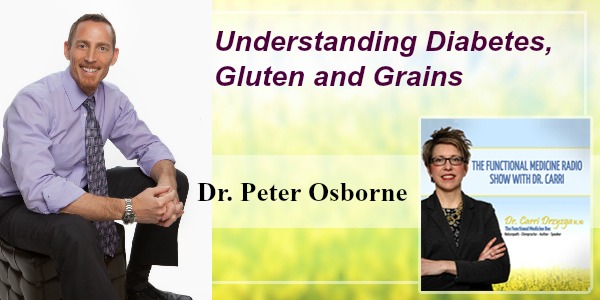Podcast: Play in new window | Download
Subscribe: Apple Podcasts | Android | RSS
In this episode of The Functional Medicine Radio Show, Dr. Carri’s special guest Dr. Peter Osborne talks about Understanding Diabetes, Gluten and Grains.
Dr. Peter Osborne is the clinical director of Origins HealthCare in Sugar Land, TX. He is a Doctor of Pastoral Science, Board Certified in Chiropractic Medicine and a Diplomate of the American Clinical Board of Nutrition. In practice since 2001, Dr. Osborne’s clinical focus is the holistic natural treatment of chronic degenerative diseases, with a primary focus on gluten sensitivity and food allergies. He founded Gluten Free Society in 2010 to help educate patients and physicians on the far reaching effects of gluten sensitivity. He is the author of “Glutenology” – a series of digital videos and e-books designed to help educate the world about gluten.
Main Questions Asked about Understanding Diabetes, Gluten and Grains:
- Can you elaborate on gluten?
- What is the difference between a healthy and unhealthy gluten free?
- Can you elaborate more on type 2 diabetes?
- What about patients that ask “Shouldn’t I still eat grains? I thought they were healthy for me”?
- What about a little bit of whole grains?
- Can you talk a little bit about what you mean by proper testing?
- Is there anything we haven’t touched on yet that you think is important for our listeners to know?
Key Points Made by Dr. Osbourne about Understanding Diabetes, Gluten and Grains:
- People that eat less gluten are not more susceptible to diabetes.
- Surveys aren’t always accurate and only give limited information.
- People that eat gluten actually have a greater risk of diabetes, especially diabetes type 1.
- Gluten is one of the trigger antecedents of auto-immune diabetes/diabetes type 1.
- Grains contain so much simple carbohydrates they can elevate blood sugar and increase insulin. So eating grains, and especially processed grains, can contribute to diabetes in a very large way.
- Regardless of gluten content, anyone eating a highly processed diet is going to have a greater risk of diabetes.
- You can’t get healthy, or achieve health, or maintain health, by eating food that isn’t healthy.
- Just because a label says “gluten free”, “fat free”, “sugar free”, etc, doesn’t make it healthy.
- One man’s food is another man’s poison. Don’t eat what you’re allergic to, sensitive to, or intolerant to.
- Listen to the wisdom of your body. No matter what tests say if your body is rejecting something or it causes a bad reaction such as fatigue, stomach pains, bloating, etc, stay away from it.
- Type 1 diabetes is an autoimmune condition that destroys a person’s ability to produce their own insulin. Type 2 diabetes is a lifestyle induced disease caused by lack of exercise and consuming too much sugar, no matter if it’s processed or natural.
- One of the best ways we can control blood sugar is through movement, activity and exercise.
- Grains aren’t bad for you unless they are processed, or you have a gluten sensitivity. But they are not a good staple food to base your diet off, as they contain proteins designed to protect them from predators which can cause intestinal distress.
- Soaking and sprouting seeds makes grains easier to digest, but they do not remove gluten.
- Using elimination diets aren’t anywhere near as effective as genetic testing for gluten.
- There are seven ways that your immune system can respond to a food, and six of them are delayed immune responses. It takes several tests to be able to determine all your food sensitivities and intolerances.
Resources Mentioned for Understanding Diabetes, Gluten and Grains:
Book – No Grain, No Pain: A 30-Day Diet for Eliminating the Root Cause of Chronic Pain
Book – Reclaim Your Energy and Feel Normal Again
Thank you for listening! If you enjoyed this podcast, please subscribe and leave a 5 star rating and review on iTunes!




